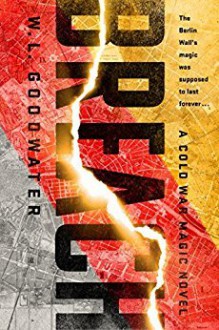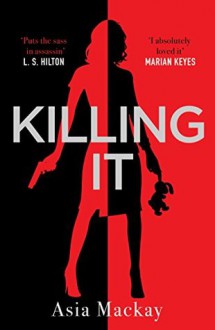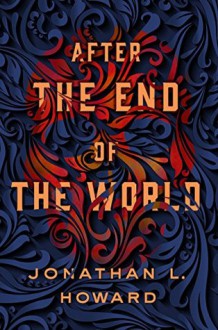
[I received a copy of this book through the First to Read program, in exchange for an honest review.]
Set in an alternate 1950s Berlin, “Breach” presents a different version of the Cold War: one where the bomb did help the Allies to win World War II, but against an enemy that had both an army and magic. The Berlin Wall, therefore, is not here merely a material wall: it is also made of magic, cast by a mix of Soviet magicians at the end of the war. And now the Wall is falling, and it’s up to both the CIA and their counterparts in the East to figure out what’s happening, how to rebuild it, and how to prevent a new war. From the USA, young magician Karen O’Neill is sent to help investigate; of course, as she discovers, things aren’t so straightforward; the men in Berlin have just as much trouble to adjust to the idea of a woman doing something else than having a husband and children; and there’s no way of telling who’s a liar, who’s not, and who’s mixing both so well that finding out the truth becomes the most difficult task ever.
The novel has its rough edges and, at times, awkward sentences and point of view switches. Some characters are clearly on the cliché side (like George, the manly-male magician who can’t get over seeing Karen sent to Germany rather than him, or Kirill, who apparently just likes to be cruel and doesn’t do anything else in life?), and not as developed as they could’ve been. And Karen’s way of facing her male peers usually amounts to giving in to the same attitudes as theirs, which makes her look perhaps too much on the defensive, which in turn diminishes her stronger side.
However, in terms of the world presented here and of the story itself, this story was a fairly enthralling read. It had, all in all, what I was looking for when I requested it. Spies and a Cold War backdrop. Magic that from the beginning offers a glimpse of its darker side (Karen and her colleague are desperately trying to find a way to use magic to heal people, because otherwise, magic seems pretty much suited for destruction and killing first and foremost). A female character, too, who has her flaws but refuses to give up and wants to get to the bottom of things. Secrets from the War, resurfacing. Extraction operations and forays into more the enemy side of Berlin. While at first, the magic itself doesn’t look terribly impressing (old, musty spells in Latin, etc.), there comes a moment when more about it is unveiled, and it hints at something definitely worth keeping in check. At all costs. (Not going to spoil, so let’s just say it dealt with a kind of effect that typically fascinates me.)
Unexpectedly, or maybe not, I found myself rooting for Erwin more than for the other characters. He has his own very dark past, but is also honestly redeeming himself, and not by hiding behind other characters—he gets his own hands dirty just as well.
Even though the pacing in the first half was slower, discovering this alternate world was enough to keep my attention here. The second half is more dynamic, although I’m torn about some of it (the finale being both awesome and “too much”, and I really can’t tell where I stand about it). The very ending, in hindsight, wasn’t unexpected; this said, it still got me, so cheers to that.
Conclusion: 3.5 stars. This novel has its faults, but also enough good points to make me interested in picking up the sequel later.

 Log in with Facebook
Log in with Facebook 









